Table of Contents
It is the rare person who is opposed to the exercise of force. The real question is — when is force justified and when is it necessary? This is one of the most important questions in human philosophy, whether one is talking about defending oneself or bigger questions of war.
We don’t pretend to have arrived at any conclusive answer on this question. We do, however, consider the words of many of history’s wisest men to be worth considering.
Even government force is not confined to the realm of war, but also the enforcement of laws. Should there be laws? If so, what ought they to be and why? When is it right and necessary for a man to resist these laws? These are, much like the above questions of the exercise of force, critical and crucial questions that go to the heart of human philosophy. Indeed, they are in many ways a simple restatement of these questions.
The following collection of quotes comes from all over the political spectrum. We do not believe that there is a single viewpoint holding a monopoly on the truth with regard to this question. Rather, a multi-faceted approach provides a fuller picture of this important topic. We hope that you will read something here that will enhance your own thinking on the subject.
Quotes About the Justification of Force
Niccoló Machiavelli
“Here a question arises: whether it is better to be loved than feared, or the reverse. The answer is, of course, that it would be best to be both loved and feared. But since the two rarely come together, anyone compelled to choose will find greater security in being feared than in being loved…Love endures by a bond which men, being fickle, may break whenever it serves their advantage to do so; but fear is supported by the dread of pain, which is ever present.”
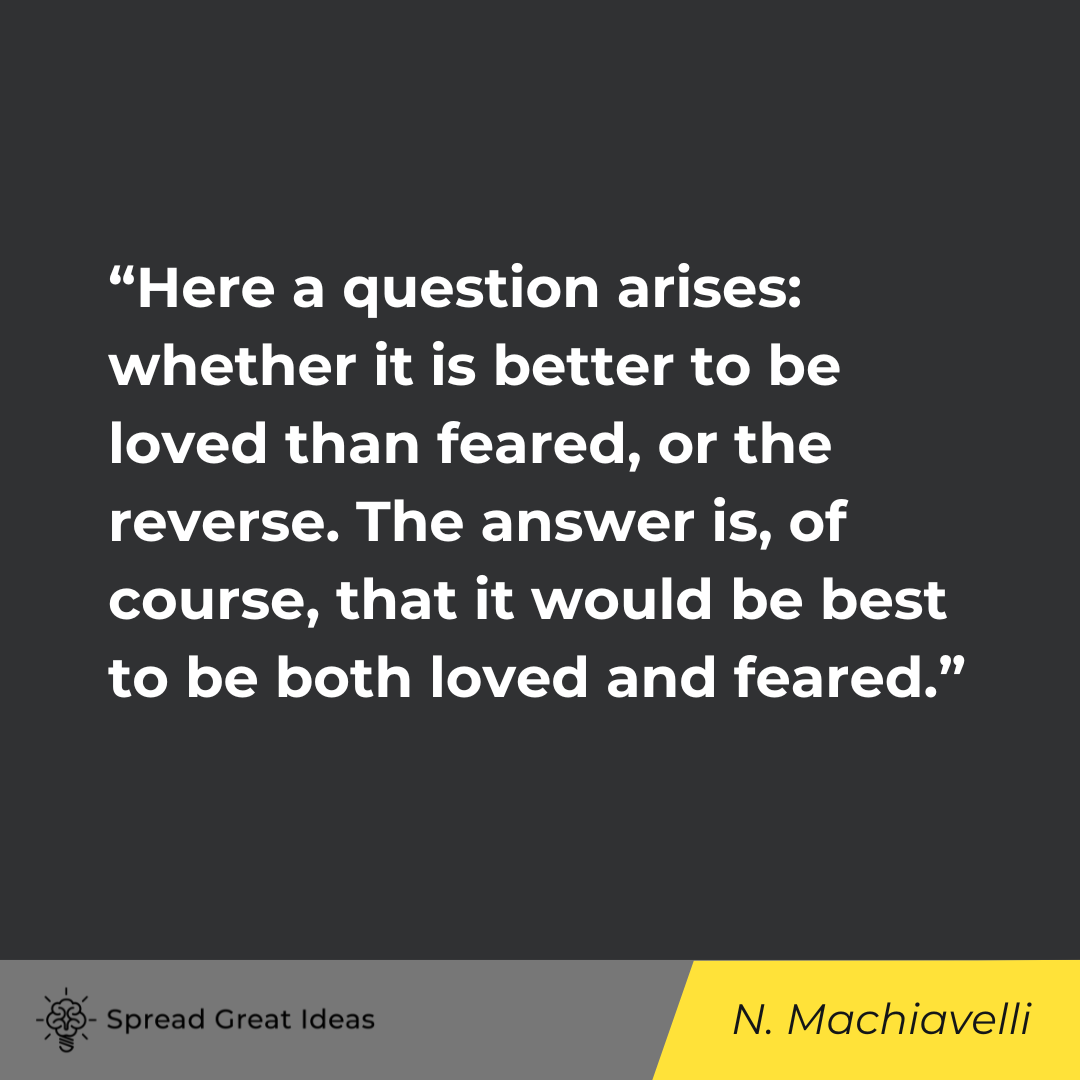
In this quote, Niccolò Machiavelli delves into the timeless debate of whether it’s preferable to be loved or feared as a leader. He astutely suggests that ideally, a leader should possess both qualities. However, recognizing the difficulty in achieving this balance, Machiavelli asserts that if one must choose, it’s safer to be feared. Fear, he argues, is a more reliable tool for maintaining control and stability because it’s rooted in the threat of consequences. Love, on the other hand, is vulnerable to the whims of human nature, subject to change when self-interests shift. Thus, Machiavelli prioritizes the pragmatic utility of fear in governance.
Niccoló Machiavelli
“Injuries ought to be done all at one time, so that, being tasted less, they offend less; benefits ought to be given little by little, so that the flavor of them may last longer.”
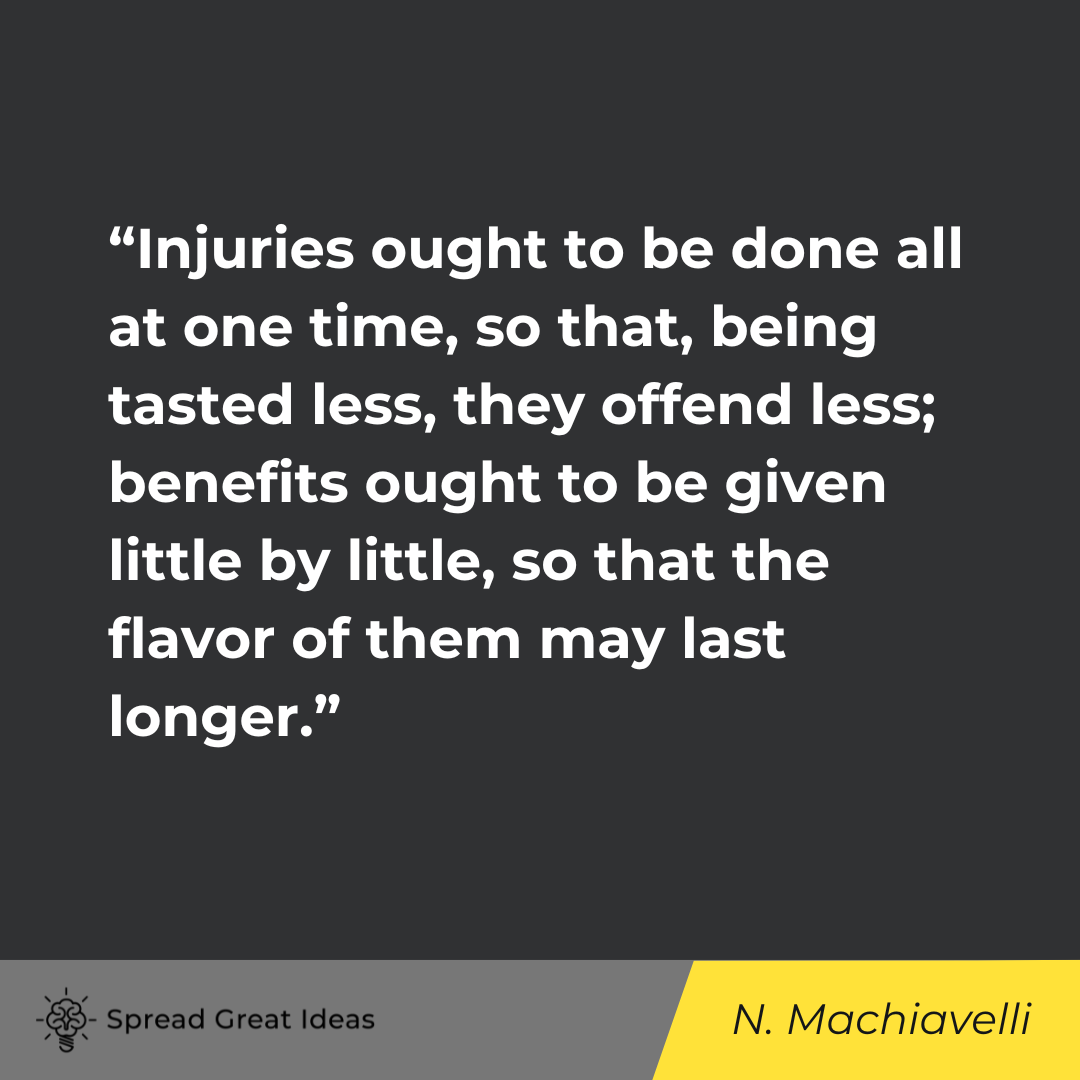
Niccolò Machiavelli, in this quote, articulates a strategy of political maneuvering and interpersonal dynamics. He suggests that when inflicting harm or retribution, it’s more effective to do so swiftly and decisively. By administering all injuries at once, the pain is diluted, causing less offense. Conversely, Machiavelli advises doling out benefits gradually, allowing their impact to linger. This approach enhances their perceived value and ensures lasting gratitude. Machiavelli’s astute observation underscores the tactical nature of power dynamics, emphasizing the importance of timing and perception in both wielding authority and fostering loyalty.
Niccoló Machiavelli
“I am firmly convinced, therefore, that to set up a republic which is to last a long time, the way to set about it is to constitute it as Sparta and Venice were constituted; to place it in a strong position, and so to fortify it that no one will dream of taking it by a sudden assault; and, on the other hand, not to make it so large as to appear formidable to its neighbors. It should in this way be able to enjoy its form of government for a long time. For war is made on a commonwealth for two reasons: to subjugate it, and for fear of being subjugated by it.”
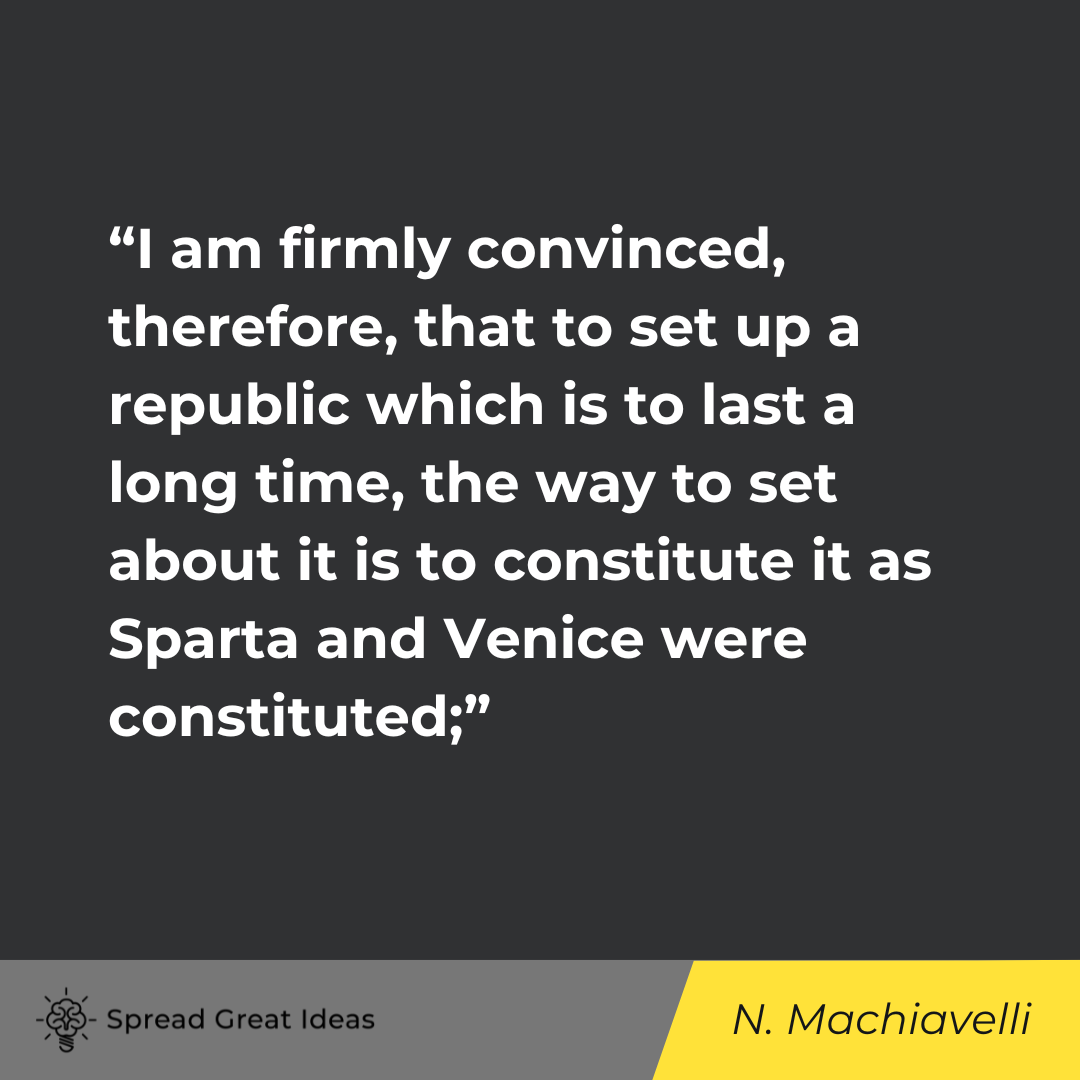
In this quote, Niccolò Machiavelli offers strategic counsel on establishing a durable republic. He advocates modeling it after resilient city-states like Sparta and Venice, emphasizing the importance of fortifying its defenses to deter adversaries. Machiavelli suggests striking a balance: making the republic formidable enough to discourage attacks yet not so expansive as to provoke neighboring powers. By achieving this equilibrium, he contends that the republic can maintain its sovereignty and governmental structure over time. Machiavelli’s insights underscore the significance of geopolitical positioning and military strength in safeguarding the longevity of a republic amidst the ever-present threats of conquest and subjugation.
Niccoló Machiavelli
“You must know, then, that there are two methods of fighting, one with laws, the other with force: the first one is proper to man, the second to beasts; but because the first one often does not suffice, one has to have recourse to the second. Therefore, it is necessary for a prince to know well how to use the beast and the man.”
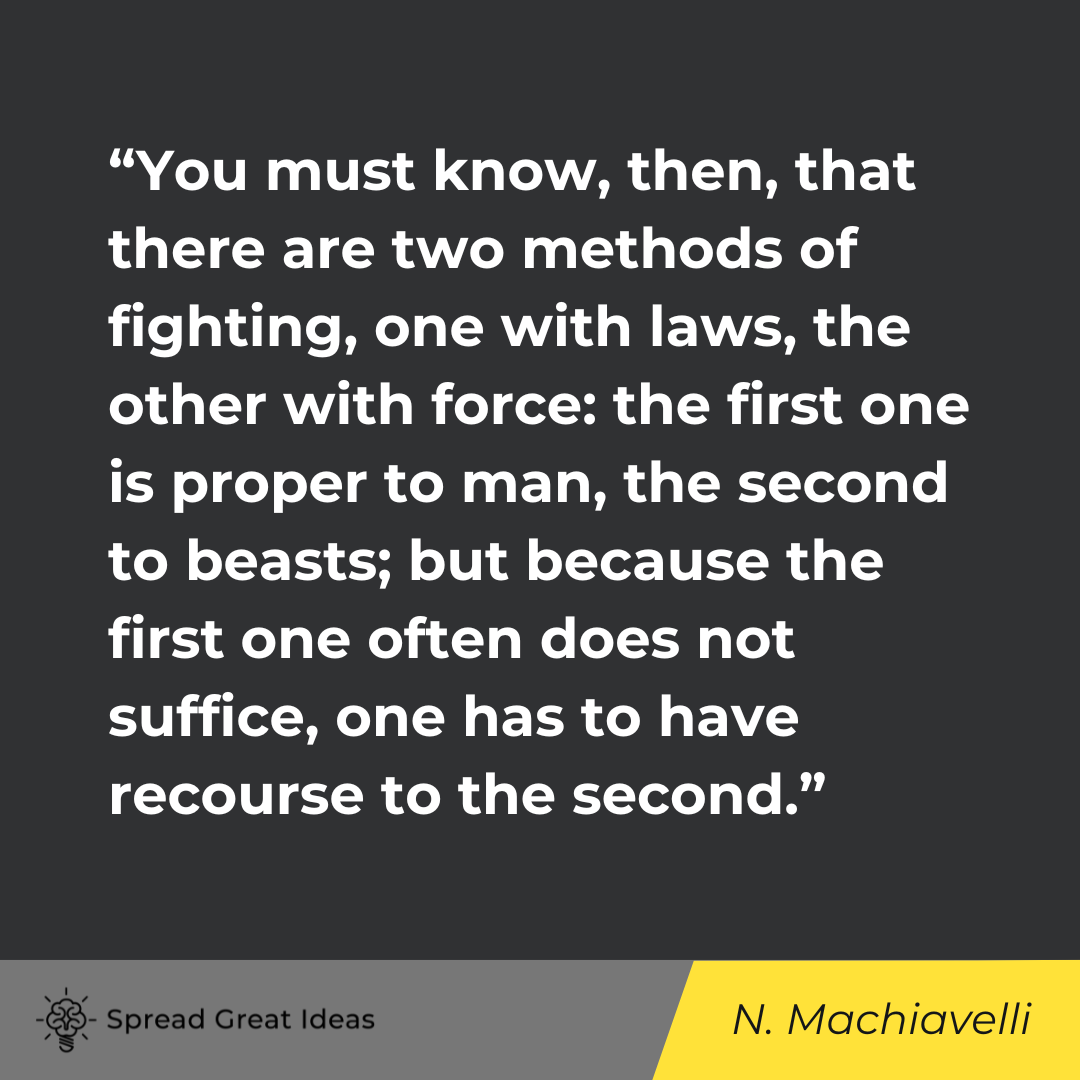
Niccolò Machiavelli, in this quote, delineates the dual nature of power and governance. He discerns between the use of laws, characteristic of human society, and brute force, akin to animal instinct. Machiavelli acknowledges the inherent limitations of legal mechanisms and recognizes the pragmatic necessity of employing force when diplomacy fails. A ruler, he contends, must adeptly navigate both realms, understanding when to wield authority and when to resort to coercion. Machiavelli’s astute observation underscores the complex interplay between civility and aggression in maintaining control, emphasizing the versatility required of effective leadership in managing both the rational and primal aspects of human nature.
Victor Davis Hanson
“I believe that human nature is constant. It’s like water – it doesn’t change. The pump changes. The delivery system changes. But there’s always going to be evil in the world. And what creates deterrence and allows innocent people in the world not to end up like those in the Balkans, in Rwanda, or the Hutus is not the utopian idea that you can eliminate war. But the realistic and pragmatic idea that you have to have military force to prevent killers from killing the innocent.”
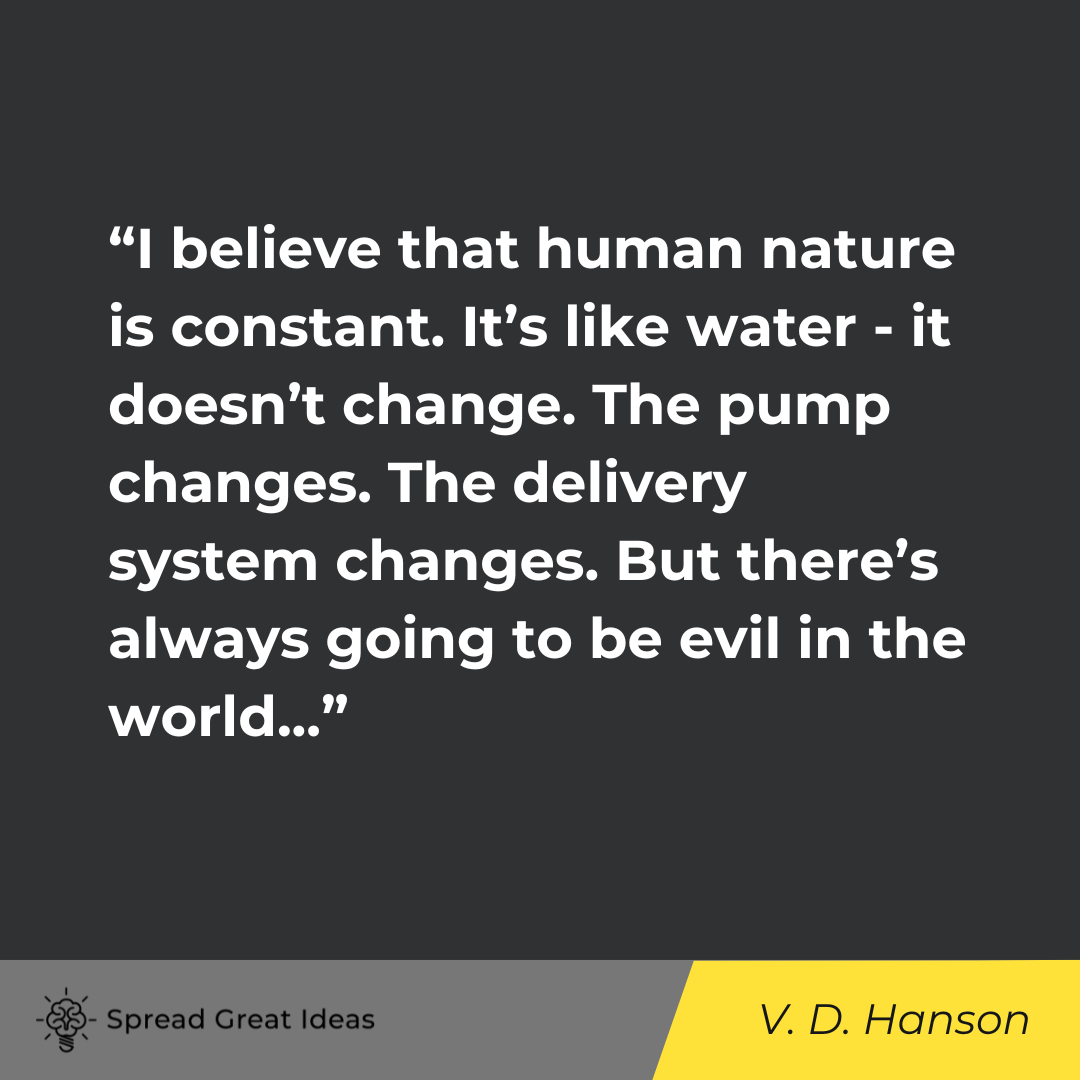
Victor Davis Hanson, in this quote, asserts a timeless perspective on human nature, likening it to water in its consistency. He contends that while the methods and technologies of conflict may evolve, the fundamental nature of humanity remains unchanged. Hanson emphasizes the necessity of military deterrence to prevent atrocities, citing historical examples like the Balkans and Rwanda. He rejects idealistic notions of eradicating war, advocating instead for a pragmatic approach that acknowledges the persistent presence of evil and the need for military strength to safeguard innocent lives. Hanson’s viewpoint underscores the importance of realistic strategies grounded in an understanding of human behavior.
Francisco José de Paula Santander
“Colombianos las armas os han dado la independencia, las leyes os darán la libertad.”
“Colombians arms have given us independence, laws will give us liberty.”
– Francisco José de Paula Santander
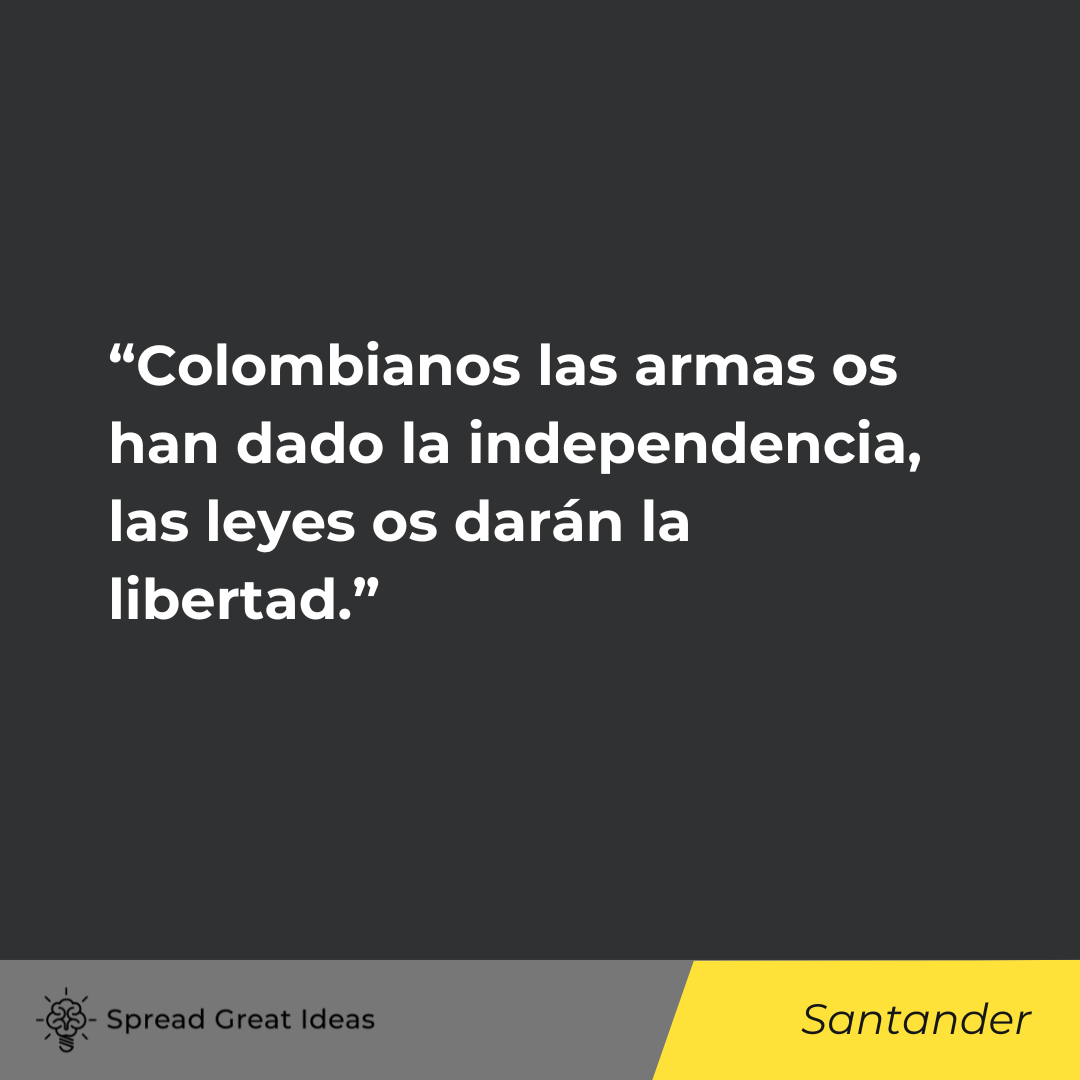
In this stirring declaration by Francisco José de Paula Santander, one of Colombia’s founding fathers, he highlights the pivotal roles of armed struggle and legal frameworks in the nation’s journey toward freedom. Santander acknowledges the indispensable role of military force in achieving independence, yet he underscores the enduring significance of laws in securing lasting liberty. He urges Colombians to recognize that while armed resistance may secure political autonomy, it is the establishment of just and equitable legal systems that truly empowers individuals and guarantees their rights. Santander’s words encapsulate the transition from revolutionary fervor to the consolidation of democratic principles in Colombia’s quest for enduring freedom.
Curtis Lemay
On the all-out bombing campaign the U.S. didn’t do at the beginning of the Korean War:
“So we go on and don’t do it, and let the war go on. Over a period of 3 and a half or four years, we did burn down every town in North Korea. And every town in South Korea. And what? Killed off 20% of the Korean population. What I’m trying to say is, once you make a decision to use military force to solve your problem – then you ought to use it. And use an overwhelming military force. Use too much. And deliberately use too much. So that you don’t make an error on the other side, and not quite have enough. And you roll over everything to start with. And you close it down just like that. You save resources. You save lives. Not only your own but the enemies too. And the recovery is quicker. And everybody is back to peaceful existence – hopefully in a shorter period of time.”
– Curtis Lemay at the 2hr 57m mark of Dan Carlin’s Hardcore History episode “The Destroyer of Worlds”
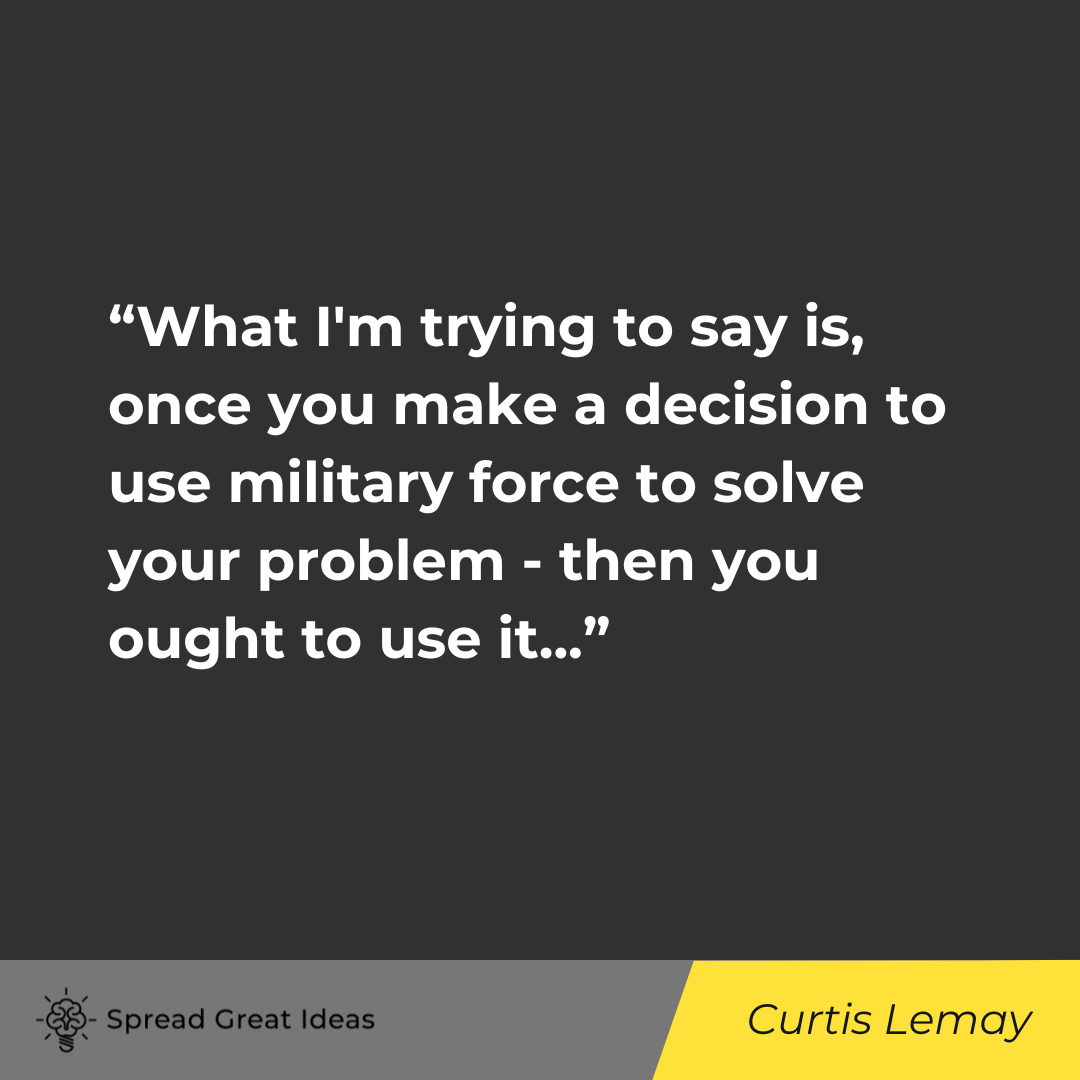
In this quote from Curtis LeMay, a prominent figure during the Korean War, he reflects on the strategic decisions made regarding the use of military force. LeMay argues for the implementation of an overwhelming bombing campaign at the onset of conflict to swiftly achieve objectives and minimize prolonged suffering. He advocates for the deliberate and excessive use of force to ensure decisive victory, emphasizing the potential benefits of a quick resolution in terms of saving resources and lives on both sides. LeMay’s perspective underscores the pragmatic approach to warfare aimed at achieving rapid and comprehensive results to facilitate a swift return to peace.
Smedley Butler
“There are only two things we should fight for. One is the defense of our homes and the other is the Bill of Rights.”
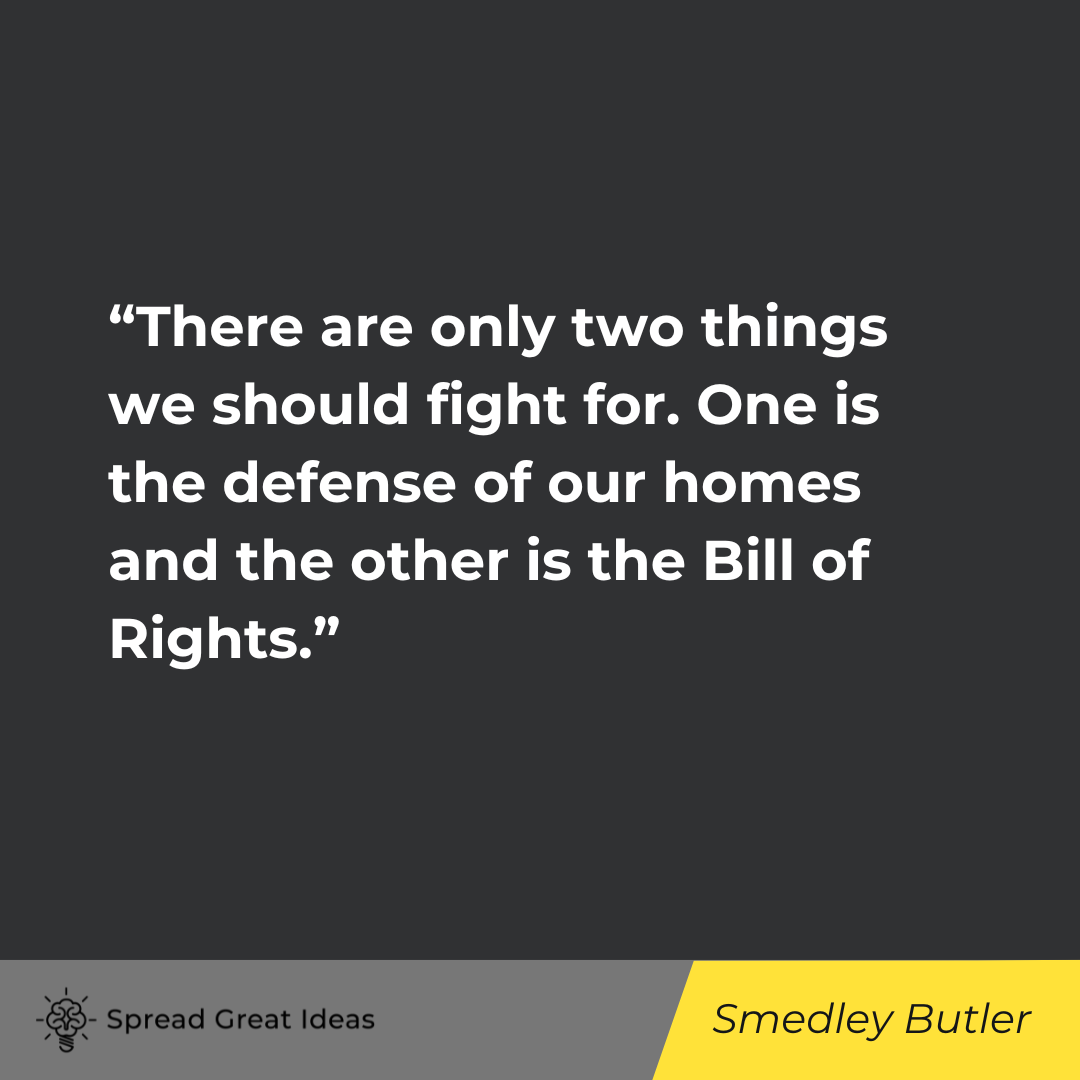
In this poignant quote attributed to Smedley Butler, a highly decorated Marine Corps general, he succinctly captures the essence of prioritization in the fight for principles. He emphasizes that there are only two causes worth fighting for: the defense of our homes, symbolizing the protection of our loved ones and the sanctity of our communities, and the Bill of Rights, signifying the preservation of our fundamental freedoms and liberties. Butler’s words underline the significance of safeguarding both our physical safety and the foundational rights that define our democracy, reminding us of the core values worthy of our utmost dedication and commitment.
Quotes About Self Defense
Ayn Rand
“The necessary consequence of man’s right to life is his right to self-defense. In a civilized society, force may be used only in retaliation and only against those who initiate its use. All the reasons which make the initiation of physical force an evil, make the retaliatory use of physical force a moral imperative.”
“If some ‘pacifist’ society renounced the retaliatory use of force, it would be left helplessly at the mercy of the first thug who decided to be immoral. Such a society would achieve the opposite of its intention: instead of abolishing evil, it would encourage and reward it.”
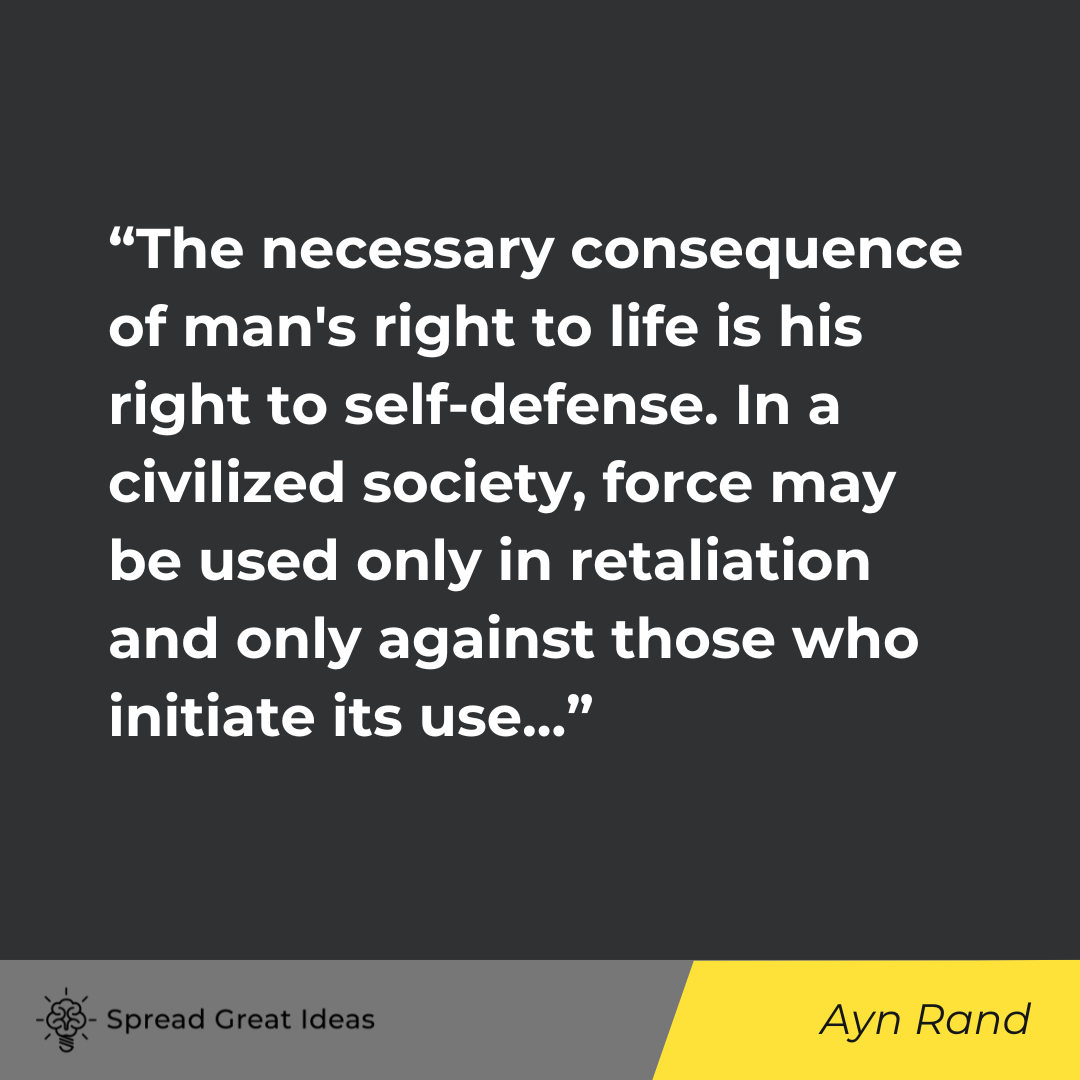
Ayn Rand’s quote eloquently articulates the moral imperative of self-defense within the framework of individual rights. She argues that the right to life inherently includes the right to defend oneself against those who threaten it. In a civilized society, the use of force should be limited to retaliation against those who initiate aggression, reflecting the principles of justice and ethical conduct. Rand warns against the folly of pacifism, suggesting that renouncing the retaliatory use of force would leave society vulnerable to exploitation by the unscrupulous. Her words underscore the necessity of maintaining the balance between peace and defense, lest righteousness succumbs to tyranny.
Ralph Waldo Emerson
“Nature has made up her mind that what cannot defend itself shall not be defended.”
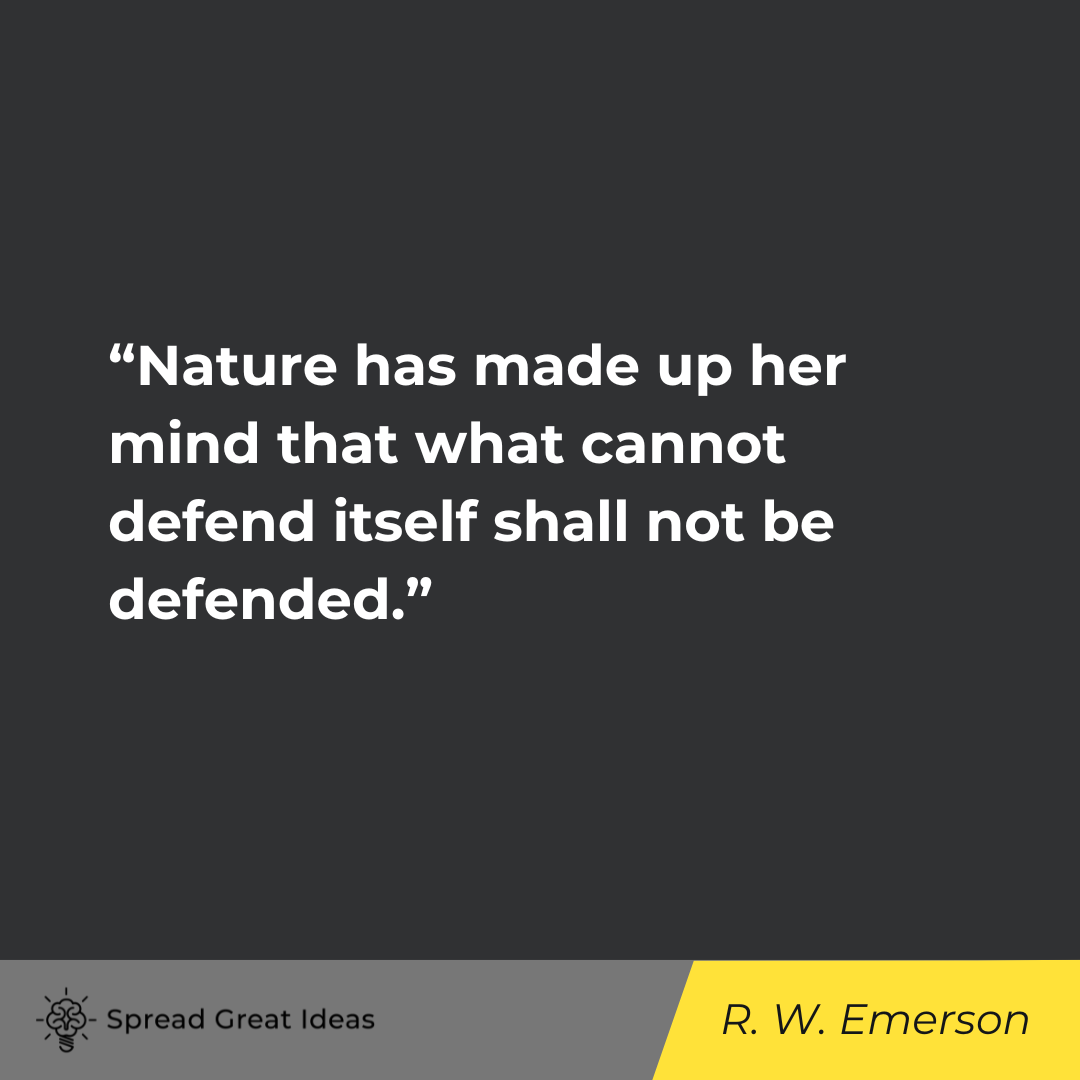
Ralph Waldo Emerson’s quote encapsulates nature’s stark principle: survival favors the capable. Here, he personifies nature as a discerning force, indicating its propensity to support only those entities with inherent defense mechanisms. In essence, Emerson suggests that in the natural order, organisms lacking the ability to fend for themselves are left unprotected. This observation resonates beyond the biological realm, hinting at broader truths about resilience and self-reliance. It serves as a sobering reminder of the importance of strength and adaptability in navigating life’s challenges, urging individuals and societies alike to cultivate their defenses to thrive in the face of adversity.
Maynard James Keenan
“Human beings are capable – every one of us – of awful shit against each other, to ourselves, and because of that, we kind of have to arm ourselves against our darker side. We have to understand that there are monsters, and we need to arm ourselves against the monsters, whether they’re our own monsters or someone else’s monsters. So I absolutely am in support of arming yourself or doing whatever we have to do to preserve our way of life.”
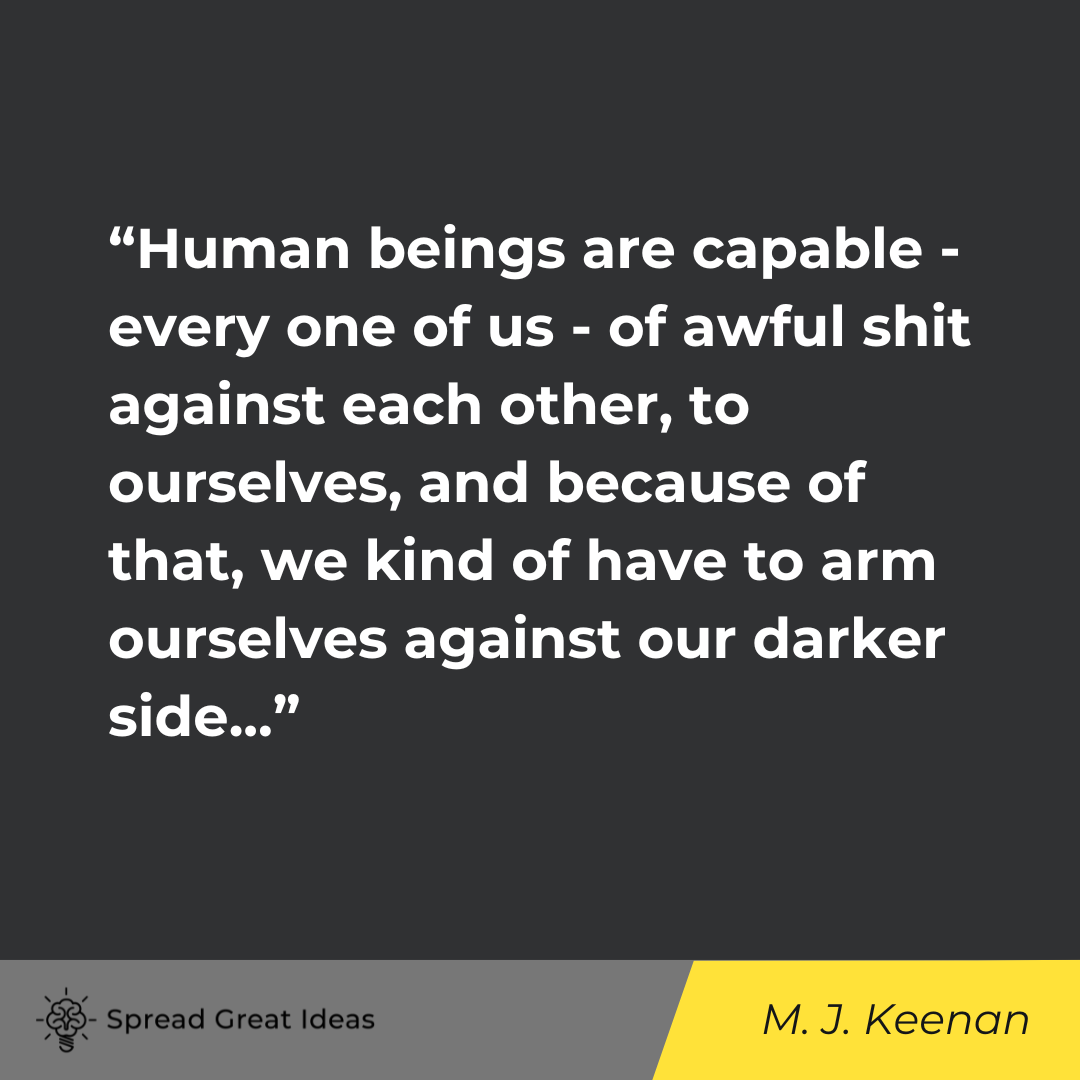
Maynard James Keenan’s quote reflects a sobering acknowledgment of humanity’s capacity for both good and evil. He emphasizes that each individual harbors the potential for destructive actions, whether directed towards others or oneself. In light of this reality, Keenan advocates for self-defense, both against external threats and the darker impulses within. He underscores the importance of recognizing and confronting the existence of “monsters,” whether they originate from within or without. Keenan’s stance suggests a pragmatic approach to preserving societal values and personal well-being, urging individuals to equip themselves mentally and physically to navigate the complexities of human nature.
Alexandre Dumas
“There are no creatures that walk the earth, not even those animals we have labelled cowards, which will not show courage when required to defend themselves.”
– Alexandre Dumas, The Vicomte de Bragelonne
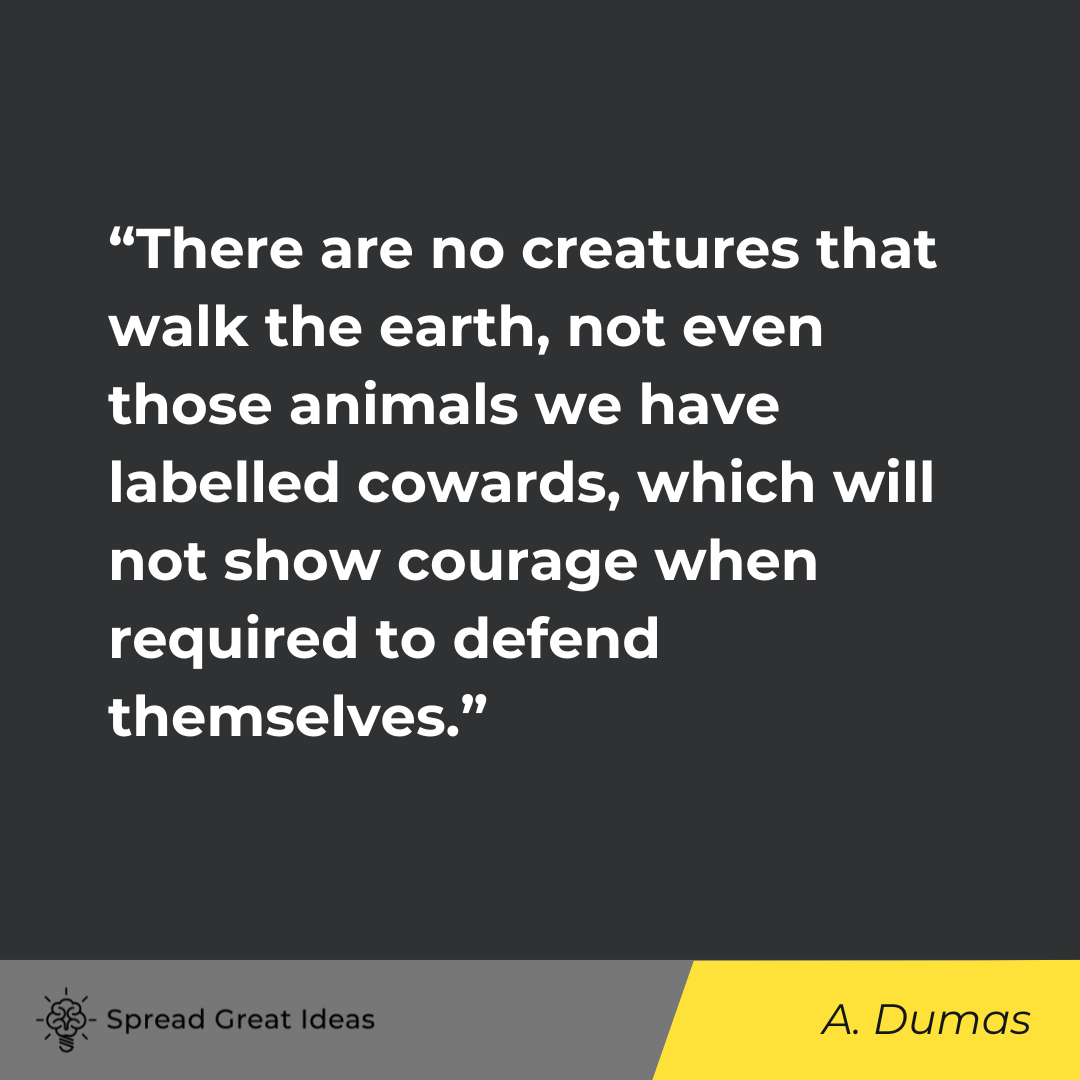
In Alexandre Dumas’ assertion from “The Vicomte de Bragelonne,” he challenges the notion of cowardice in all creatures, emphasizing their innate capacity for courage when faced with survival threats. Dumas suggests that even those traditionally considered timid or weak will exhibit bravery when their existence is at stake. This observation speaks to the primal instinct ingrained within all living beings to protect themselves in times of danger. By highlighting this universal trait, Dumas prompts reflection on the complexities of courage and fear, transcending species boundaries and inviting a deeper understanding of the resilience inherent in life’s diverse forms.
